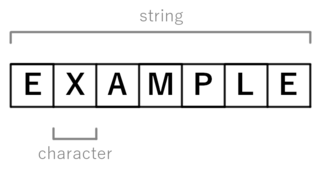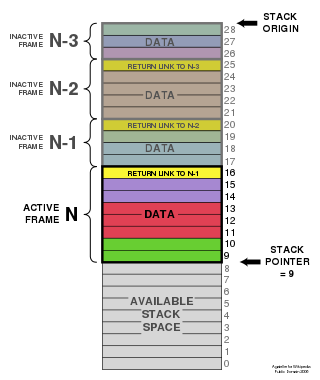Related Research Articles

In programming and information security, a buffer overflow or buffer overrun is an anomaly whereby a program writes data to a buffer beyond the buffer's allocated memory, overwriting adjacent memory locations.
C is a general-purpose computer programming language. It was created in the 1970s by Dennis Ritchie, and remains very widely used and influential. By design, C's features cleanly reflect the capabilities of the targeted CPUs. It has found lasting use in operating systems, device drivers, and protocol stacks, but its use in application software has been decreasing. C is commonly used on computer architectures that range from the largest supercomputers to the smallest microcontrollers and embedded systems.

In computer programming, a string is traditionally a sequence of characters, either as a literal constant or as some kind of variable. The latter may allow its elements to be mutated and the length changed, or it may be fixed. A string is generally considered as a data type and is often implemented as an array data structure of bytes that stores a sequence of elements, typically characters, using some character encoding. String may also denote more general arrays or other sequence data types and structures.
Defensive programming is a form of defensive design intended to develop programs that are capable of detecting potential security abnormalities and make predetermined responses. It ensures the continuing function of a piece of software under unforeseen circumstances. Defensive programming practices are often used where high availability, safety, or security is needed.
Berkeley sockets is an application programming interface (API) for Internet sockets and Unix domain sockets, used for inter-process communication (IPC). It is commonly implemented as a library of linkable modules. It originated with the 4.2BSD Unix operating system, which was released in 1983.
In computer programming, standard streams are interconnected input and output communication channels between a computer program and its environment when it begins execution. The three input/output (I/O) connections are called standard input (stdin), standard output (stdout) and standard error (stderr). Originally I/O happened via a physically connected system console, but standard streams abstract this. When a command is executed via an interactive shell, the streams are typically connected to the text terminal on which the shell is running, but can be changed with redirection or a pipeline. More generally, a child process inherits the standard streams of its parent process.
The C programming language provides many standard library functions for file input and output. These functions make up the bulk of the C standard library header <stdio.h>. The functionality descends from a "portable I/O package" written by Mike Lesk at Bell Labs in the early 1970s, and officially became part of the Unix operating system in Version 7.
The C standard library or libc is the standard library for the C programming language, as specified in the ISO C standard. Starting from the original ANSI C standard, it was developed at the same time as the C library POSIX specification, which is a superset of it. Since ANSI C was adopted by the International Organization for Standardization, the C standard library is also called the ISO C library.
In computer programming, a null-terminated string is a character string stored as an array containing the characters and terminated with a null character. Alternative names are C string, which refers to the C programming language and ASCIIZ.
Buffer overflow protection is any of various techniques used during software development to enhance the security of executable programs by detecting buffer overflows on stack-allocated variables, and preventing them from causing program misbehavior or from becoming serious security vulnerabilities. A stack buffer overflow occurs when a program writes to a memory address on the program's call stack outside of the intended data structure, which is usually a fixed-length buffer. Stack buffer overflow bugs are caused when a program writes more data to a buffer located on the stack than what is actually allocated for that buffer. This almost always results in corruption of adjacent data on the stack, which could lead to program crashes, incorrect operation, or security issues.

Stacks in computing architectures are regions of memory where data is added or removed in a last-in-first-out (LIFO) manner.

Xlib is an X Window System protocol client library written in the C programming language. It contains functions for interacting with an X server. These functions allow programmers to write programs without knowing the details of the X protocol.
Dynamic-link library (DLL) is Microsoft's implementation of the shared library concept in the Microsoft Windows and OS/2 operating systems. These libraries usually have the file extension DLL, OCX, or DRV . The file formats for DLLs are the same as for Windows EXE files – that is, Portable Executable (PE) for 32-bit and 64-bit Windows, and New Executable (NE) for 16-bit Windows. As with EXEs, DLLs can contain code, data, and resources, in any combination.
The OpenBSD operating system focuses on security and the development of security features. According to author Michael W. Lucas, OpenBSD "is widely regarded as the most secure operating system available anywhere, under any licensing terms."
Exception safety is the state of code working correctly when exceptions are thrown. To aid in ensuring exception safety, C++ standard library developers have devised a set of exception safety levels, contractual guarantees of the behavior of a data structure's operations with regards to exceptions. Library implementers and clients can use these guarantees when reasoning about exception handling correctness. The exception safety levels apply equally to other languages and error-handling mechanisms.
The C++ programming language has support for string handling, mostly implemented in its standard library. The language standard specifies several string types, some inherited from C, some designed to make use of the language's features, such as classes and RAII. The most-used of these is std::string.
In software engineering, a fluent interface is an object-oriented API whose design relies extensively on method chaining. Its goal is to increase code legibility by creating a domain-specific language (DSL). The term was coined in 2005 by Eric Evans and Martin Fowler.
In computing, undefined value is a condition where an expression does not have a correct value, although it is syntactically correct. An undefined value must not be confused with empty string, Boolean "false" or other "empty" values. Depending on circumstances, evaluation to an undefined value may lead to exception or undefined behaviour, but in some programming languages undefined values can occur during a normal, predictable course of program execution.
The C programming language has a set of functions implementing operations on strings in its standard library. Various operations, such as copying, concatenation, tokenization and searching are supported. For character strings, the standard library uses the convention that strings are null-terminated: a string of n characters is represented as an array of n + 1 elements, the last of which is a "NUL character" with numeric value 0.
In the C++ programming language, input/output library refers to a family of class templates and supporting functions in the C++ Standard Library that implement stream-based input/output capabilities. It is an object-oriented alternative to C's FILE-based streams from the C standard library.
References
- 1 2 "About Strsafe.h (Windows)".
- 1 2 Richter, Jeffrey; Nasarre, Christophe. Windows via C/C++ Fifth Edition. Microsoft Press. pp. 11–32. ISBN 9780735663770.
- ↑ Daswani, Neil; Kern, Christopher; Kesavan, Anita. Foundations of Security: What Every Programmer Needs To Know. Apress Media LLC. p. 121. ISBN 9781590597842.
- ↑ Plakosh, Daniel. "Strsafe.h | Build Security In".